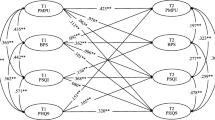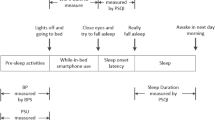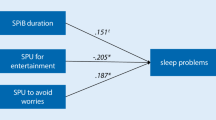Abstract
The high prevalence of problematic smartphone use (PSU) among adolescents has raised public concern due to its negative health consequences, such as sleep problems. The current longitudinal study aimed to investigate the prospective effects of PSU and fear of missing out (FoMO) on both bedtime procrastination and sleep duration among Chinese adolescents. Three hundred eighteen Chinese high school students (Mage = 16.92, SD = 0.67) completed an anonymous questionnaire at both baseline and 6-month follow-up. The results of the analyses showed that both PSU and FoMO were correlated with greater bedtime procrastination and shorter sleep duration. However, path analysis revealed that only baseline PSU (β = .11, p < .05) but not baseline FoMO (β = .05, p > .05) predicted bedtime procrastination at the 6-month follow-up, while sleep duration assessed at the follow-up survey was significantly predicted by only baseline bedtime procrastination (β = −.16, p < .01). Our findings support the adverse effect of PSU on adolescent sleep health, while that of FoMO may not be as direct as expected. Future studies with three or more waves of data collection are recommended for properly testing the prospective, probably indirect, effects of PSU, FoMO, and other emotional or cognitive factors on sleep quality.


Similar content being viewed by others
Data Availability
The dataset used in the current study is available from the corresponding author on reasonable request.
References
Adams, S. K., Murdock, K. K., Daly-Cano, M., & Rose, M. (2020). Sleep in the social world of college students: Bridging interpersonal stress and fear of missing out with mental health. Behavioral Sciences, 10(2), 54.
Al-Barashdi, H. S., Bouazza, A., & Jabur, N. H. (2015). Smartphone addiction among university undergraduates: a literature review. Journal of Scientific Research & Reports, 4(3), 210–225.
Alkhatatbeh, M. J., Abdul-Razzak, K. K., & Khwaileh, H. N. (2020). Poor sleep quality among young adults: The role of anxiety, depression, musculoskeletal pain, and low dietary calcium intake. Perspectives in Psychiatric Care. https://doi.org/10.1111/ppc.12533
Alvaro, P. K., Roberts, R. M., & Harris, J. K. (2013). A systematic review assessing bidirectionality between sleep disturbances, anxiety, and depression. Sleep, 36(7), 1059–1068. https://doi.org/10.5665/sleep.2810.
Augner, C., & Hacker, G. W. (2012). Associations between problematic mobile phone use and psychological parameters in young adults. International Journal of Public Health, 57(2), 437–441.
Baker, Z. G., Krieger, H., & LeRoy, A. S. (2016). Fear of missing out: Relationships with depression, mindfulness, and physical symptoms. Translational Issues in Psychological Science, 2(3), 275–282.
Billieux, J. (2012). Problematic use of the mobile phone: a literature review and a pathways model. Current Psychiatry Reviews, 8(4), 299–307.
Billieux, J., Maurage, P., Lopez-Fernandez, O., Kuss, D. J., & Griffiths, M. D. (2015). Can disordered mobile phone use be considered a behavioral addiction? An update on current evidence and a comprehensive model for future research. Current Addiction Reports, 2(2), 156–162.
Billieux, J., Van der Linden, M., & Rochat, L. (2008). The role of impulsivity in actual and problematic use of the mobile phone. Applied Cognitive Psychology, 22(9), 1195–1210.
Brodar, K. E., La Greca, A. M., Hysing, M., & Llabre, M. M. (2020). Stressors, repetitive negative thinking, and insomnia symptoms in adolescents beginning high school. Journal of Pediatric Psychology, 45(9), 1027–1038.
Buctot, D. B., Kim, N., & Kim, J. J. (2020). Factors associated with smartphone addiction prevalence and its predictive capacity for health-related quality of life among Filipino adolescents. Children and Youth Services Review, 110, 104758. https://doi.org/10.1016/j.childyouth.2020.104758
Buysse, D. J., Reynolds III, C. F., Monk, T. H., Berman, S. R., & Kupfer, D. J. (1989). The Pittsburgh Sleep Quality Index: A new instrument for psychiatric practice and research. Psychiatry Research, 28(2), 193–213. https://doi.org/10.1016/0165-1781(89)90047-4.
Cain, N., & Gradisar, M. (2010). Electronic media use and sleep in school-aged children and adolescents: A review. Sleep Medicine, 11, 735–742. https://doi.org/10.1016/j.sleep.2010.02.006.
Casey, B. J., & Caudle, K. (2013). The teenage brain: Self-control. Current Directions in Psychological Science, 22(2), 82–87. https://doi.org/10.1177/0963721413480170.
Chung, S. J., An, H., & Suh, S. (2020). What do people do before going to bed? A study of bedtime procrastination using time use surveys. Sleep, 43(4), zsz267. https://doi.org/10.1093/sleep/zsz267.
China Internet Network Information Center (2019). The 43th statistical report on the development of Internet in China. Retrieved from http://www.cnnic.net.cn/
Coco, G. L., Salerno, L., Franchina, V., La Tona, A., Di Blasi, M., & Giordano, C. (2020). Examining bi-directionality between Fear of Missing Out and problematic smartphone use. A two-wave panel study among adolescents. Addictive Behaviors, 106, 106360. https://doi.org/10.1016/j.addbeh.2020.106360.
Connor, J., Norton, R., Ameratunga, S., Robinson, E., Civil, I., Dunn, R., et al. (2002). Driver sleepiness and risk of serious injury to car occupants: population based case control study. British Medical Journal, 324, 1125. https://doi.org/10.1136/bmj.324.7346.1125.
CNNIC. (2020). Research Report on Chinese Social Application User Behavior. http://cnnic.cn/hlwfzyj/hlwxzbg/hlwtjbg/202004/P020200428399188064169.pdf.
Deci, E. L., & Ryan, R. M. (2008). Self-determination theory: A macrotheory of human motivation, development, and health. Canadian Psychology/Psychologie Canadienne, 49(3), 182–185.
Demirci, K., Akgönül, M., & Akpinar, A. (2015). Relationship of smartphone use severity with sleep quality, depression, and anxiety in university students. Journal of Behavioral Addictions, 4(2), 85–92. https://doi.org/10.1556/2006.4.2015.010.
Dempsey, A. E., O'Brien, K. D., Tiamiyu, M. F., & Elhai, J. D. (2019). Fear of missing out (FoMO) and rumination mediate relations between social anxiety and problematic Facebook use. Addictive Behaviors Reports, 9, 100–150. https://doi.org/10.1016/j.abrep.2018.100150.
Deng, T., Kanthawala, S., Meng, J., Peng, W., Kononova, A., Hao, Q., et al. (2019). Measuring smartphone usage and task switching with log tracking and self-reports. Mobile Media & Communication, 7(1), 3–23.
Dewald, J. F., Meijer, A. M., Oort, F. J., Kerkhof, G. A., & Bögels, S. M. (2010). The influence of sleep quality, sleep duration and sleepiness on school performance in children and adolescents: A meta-analytic review. Sleep Medicine Reviews, 14(3), 179–189. https://doi.org/10.1016/j.smrv.2009.10.004.
Eitivipart, A. C., Viriyarojanakul, S., & Redhead, L. (2018). Musculoskeletal disorder and pain associated with smartphone use: A systematic review of biomechanical evidence. Hong Kong Physiotherapy Journal, 38(02), 77–90. https://doi.org/10.1142/S1013702518300010.
Elhai, J. D., Dvorak, R. D., Levine, J. C., & Hall, B. J. (2017). Problematic smartphone use: A conceptual overview and systematic review of relations with anxiety and depression psychopathology. Journal of Affective Disorders, 207, 251–259. https://doi.org/10.1016/j.jad.2016.08.030.
Elhai, J. D., Levine, J. C., Dvorak, R. D., & Hall, B. J. (2016). Fear of missing out, need for touch, anxiety and depression are related to problematic smartphone use. Computers in Human Behavior, 63, 509–516. https://doi.org/10.1016/j.chb.2016.05.079.
Ellis, D. A., Davidson, B. I., & Kaye, L. K. (2019). Should smartphones be banned for children or does cyberpsychology have a bigger problem? Cyberpsychology, Behavior, and Social Networking, 22(7), 508–509.
Fang, J., Wang, X., Wen, Z., & Zhou, J. (2020). Fear of missing out and problematic social media use as mediators between emotional support from social media and phubbing behavior. Addictive Behaviors, 106430. https://doi.org/10.1016/j.addbeh.2020.106430.
Gezgin, D. M. (2018). Understanding Patterns for Smartphone Addiction: Age, Sleep Duration, Social Network Use and Fear of Missing Out. Cypriot Journal of Educational Sciences, 13(2), 166–177.
Hirshkowitz, M., Whiton, K., Albert, S. M., Alessi, C., Bruni, O., DonCarlos, L., et al. (2015). National Sleep Foundation’s sleep time duration recommendations: methodology and results summary. Sleep Health, 1(1), 40–43. https://doi.org/10.1016/j.sleh.2014.12.010.
Holte, A. J., & Ferraro, F. R. (2020). Anxious, bored, and (maybe) missing out: Evaluation of anxiety attachment, boredom proneness, and fear of missing out (FoMO). Computers in Human Behavior, 106465. https://doi.org/10.1016/j.chb.2020.106465
Hui, B. P. H., Wu, A., Siu, N. Y., Chung, M. L., & Pun, N. (2019). The effects of need satisfaction and dissatisfaction on flourishing among young Chinese gamers: the mediating role of internet gaming disorder. International Journal of Environmental Research and Public Health, 16(22), 4367.
Hayes, A. F. (2009). Beyond Baron and Kenny: Statistical mediation analysis in the new millennium. Communication Monographs, 76(4), 408–420.
Jeong, H., Yim, H. W., Lee, S. Y., Lee, H. K., Potenza, M. N., Kwon, J. H., et al. (2018). Discordance between self-report and clinical diagnosis of Internet gaming disorder in adolescents. Scientific Reports, 8(1), 1–8.
Ji, W. M., Shen, J., Yang, B. Y., & Ji, L. (2018). Annual report of the Internet use and reading practice of Chinese minors (2017∼2018) (pp. 71–89). Social Sciences Academic Press.
Kim, E., & Koh, E. (2018). Avoidant attachment and smartphone addiction in college students: The mediating effects of anxiety and self-esteem. Computers in Human Behavior, 84, 264–271. https://doi.org/10.1016/j.chb.2018.02.037.
Kroese, F. M., De Ridder, D. T., Evers, C., & Adriaanse, M. A. (2014). Bedtime procrastination: Introducing a new area of procrastination. Frontiers in Psychology, 5, 611. https://doi.org/10.3389/fpsyg.2014.00611.
Kroese, F. M., Evers, C., Adriaanse, M. A., & de Ridder, D. T. (2016a). Bedtime procrastination: A self-regulation perspective on sleep insufficiency in the general population. Journal of Health Psychology, 21(5), 853–862. https://doi.org/10.1177/1359105314540014.
Kroese, F. M., Nauts, S., Kamphorst, B. A., Anderson, J. H., & de Ridder, D. T. (2016b). Bedtime procrastination: a behavioral perspective on sleep insufficiency. In Procrastination, health, and well-being (pp. 93–119). Academic Press.
Kuss, D. J., Harkin, L., Kanjo, E., & Billieux, J. (2018a). Problematic smartphone use: Investigating contemporary experiences using a convergent design. International Journal of Environmental Research and Public Health, 15(1), 142.
Kuss, D. J., Kanjo, E., Crook-Rumsey, M., Kibowski, F., Wang, G. Y., & Sumich, A. (2018b). Problematic mobile phone use and addiction across generations: the roles of psychopathological symptoms and smartphone use. Journal of Technology in Behavioral Science, 1–9.
Lee, C., & Lee, S.-J. (2017). Prevalence and predictors of smartphone addiction proneness among Korean adolescents. Children and Youth Services Review, 77, 10–17. https://doi.org/10.1016/j.childyouth.2017.04.002.
Liu, Q. Q., Zhou, Z. K., Yang, X. J., Kong, F. C., Niu, G. F., & Fan, C. Y. (2017). Mobile phone addiction and sleep quality among Chinese adolescents: A moderated mediation model. Computers in Human Behavior, 72, 108–114. https://doi.org/10.1016/j.chb.2017.02.042.
Liu, X., Zhang, L., Wu, G., Yang, R., & Liang, Y. (2021). The longitudinal relationship between sleep problems and school burnout in adolescents: A cross-lagged panel analysis. Journal of Adolescence, 88, 14–24.
Lin, Y. H., Chiang, C. L., Lin, P. H., Chang, L. R., Ko, C. H., Lee, Y. H., & Lin, S. H. (2016). Proposed diagnostic criteria for smartphone addiction. PLoS One., 11(11), e163010. https://doi.org/10.1371/journal.pone.0163010.
Lin, Y. H., Pan, Y. C., Lin, S. H., & Chen, S. H. (2017). Development of short-form and screening cutoff point of the Smartphone Addiction Inventory (SPAI-SF). International Journal of Methods in Psychiatric Research, 26(2), e1525.
Long, J., Wang, P., Liu, S., & Lei, L. (2019). Materialism and adolescent problematic smartphone use: The mediating role of fear of missing out and the moderating role of narcissism. Current Psychology, 1–9.
Lowe-Calverley, E., & Pontes, H. M. (2020). Challenging the concept of smartphone addiction: An empirical pilot study of smartphone usage patterns and psychological well-being. Cyberpsychology, Behavior, and Social Networking, 23(8), 550–556.
Mathieu, J. E., & Taylor, S. R. (2006). Clarifying conditions and decision points for mediational type inferences in organizational behavior. Journal of Organizational Behavior: The International Journal of Industrial, Occupational and Organizational Psychology and Behavior, 27(8), 1031–1056.
Milyavskaya, M., Saffran, M., Hope, N., & Koestner, R. (2018). Fear of missing out: prevalence, dynamics, and consequences of experiencing FOMO. Motivation and Emotion, 42(5), 725–737. https://doi.org/10.1007/s11031-018-9683-5.
Orben, A., & Przybylski, A. K. (2019). The association between adolescent well-being and digital technology use. Nature Human Behaviour, 3(2), 173–182.
Przybylski, A. K., Murayama, K., DeHaan, C. R., & Gladwell, V. (2013). Motivational, emotional, and behavioral correlates of fear of missing out. Computers in Human Behavior, 29(4), 1841–1848. https://doi.org/10.1016/j.chb.2013.02.014.
Ryan, R. M., & Deci, E. L. (2000). Self-determination theory and the facilitation of intrinsic motivation, social development, and well-being. American Psychologist, 55(1), 68.
Roane, B. M., & Taylor, D. J. (2008). Adolescent insomnia as a risk factor for early adult depression and substance abuse. Sleep, 31, 1351–1356. https://doi.org/10.5665/sleep/31.10.1351.
Roberts, R. E., & Duong, H. T. (2017). Is there an association between short sleep duration and adolescent anxiety disorders? Sleep Medicine, 30, 82–87. https://doi.org/10.1016/j.sleep.2016.02.007.
Sohn, S., Rees, P., Wildridge, B., Kalk, N. J., & Carter, B. (2019). Prevalence of problematic smartphone usage and associated mental health outcomes amongst children and young people: a systematic review, meta-analysis and GRADE of the evidence. BMC Psychiatry, 19(1), 1–10. https://doi.org/10.1186/s12888-019-2350-x.
Scott, H., Gardani, M., Biello, S., & Woods, H. C. (2016). Social media use, fear of missing out and sleep outcomes in adolescence. In Congress of the European Sleep Research Society.
Scott, H., & Woods, H. C. (2018). Fear of missing out and sleep: Cognitive behavioural factors in adolescents' nighttime social media use. Journal of Adolescence, 68, 61–65. https://doi.org/10.1016/j.adolescence.2018.07.009.
Strine, T. W., & Chapman, D. P. (2005). Associations of frequent sleep insufficiency with health-related quality of life and health behaviors. Sleep Medicine, 6, 23–27. https://doi.org/10.1016/j.sleep.2004.06.003.
Thomée, S., Härenstam, A., & Hagberg, M. (2011). Mobile phone use and stress, sleep disturbances, and symptoms of depression among young adults: A prospective cohort study. BMC Public Health, 11(1), 66. https://doi.org/10.1186/1471-2458-11-66.
Tunc-Aksan, A., & Akbay, S. E. (2019). Smartphone addiction, fear of missing out, and perceived competence as predictors of social media addiction of adolescents. European Journal of Educational Research, 8(2), 559–566.
Wang, J., Wang, P., Yang, X., Zhang, G., Wang, X., Zhao, F., et al. (2019). Fear of missing out and procrastination as mediators between sensation seeking and adolescent smartphone addiction. International Journal of Mental Health and Addiction, 17(4), 1049–1062. https://doi.org/10.1007/s11469-019-00106-0.
Wang, P., Xie, X., Wang, X., Wang, X., Zhao, F., Chu, X., et al. (2018). The need to belong and adolescent authentic self-presentation on SNSs: A moderated mediation model involving FoMO and perceived social support. Personality and Individual Differences, 128, 133–138. https://doi.org/10.1016/j.paid.2018.02.035.
Wolniewicz, C. A., Tiamiyu, M. F., Weeks, J. W., & Elhai, J. D. (2018). Problematic smartphone use and relations with negative affect, fear of missing out, and fear of negative and positive evaluation. Psychiatry Research, 262, 618–623. https://doi.org/10.1016/j.psychres.2017.09.058.
Xie, X., Dong, Y., & Wang, J. (2018a). Sleep quality as a mediator of problematic smartphone use and clinical health symptoms. Journal of Behavioral Addictions, 7(2), 466–472. https://doi.org/10.1556/2006.7.2018.40.
Xie, Y., Szeto, G. P., Dai, J., & Madeleine, P. (2016). A comparison of muscle activity in using touchscreen smartphone among young people with and without chronic neck-shoulder pain. Ergonomics, 59(1), 61–72. https://doi.org/10.1080/00140139.2015.1056237.
Xie, X., Wang, Y., Wang, P., Zhao, F., & Lei, L. (2018b). Basic psychological needs satisfaction and fear of missing out: Friend support moderated the mediating effect of individual relative deprivation. Psychiatry Research, 268, 223–228. https://doi.org/10.1016/j.psychres.2018.07.025.
Yan, Y. W., Lin, R. M., Su, Y. K., & Liu, M. Y. (2018). The relationship between adolescent academic stress and sleep quality: A multiple mediation model. Social Behavior and Personality: An International Journal, 46(1), 63–77.
Yu, S., & Sussman, S. (2020). Does Smartphone Addiction Fall on a Continuum of Addictive Behaviors? International Journal of Environmental Research and Public Health, 17(2), 422. https://doi.org/10.3390/ijerph17020422.
Zhang, M. X., & Wu, A. M. S. (2020). Effects of smartphone addiction on sleep quality among Chinese university students: The mediating role of self-regulation and bedtime procrastination. Addictive Behaviors, 106552. https://doi.org/10.1016/j.addbeh.2020.106552
Zou, Y., Xia, N., Zou, Y., Chen, Z., & Wen, Y. (2019). Smartphone addiction may be associated with adolescent hypertension: a cross-sectional study among junior school students in China. BMC Pediatrics, 19(1), 31. https://doi.org/10.1186/s12887-019-1699-9.
Funding
This work was supported by the University of Macau (Ref #: MYRG2019–00014-FSS).
Author information
Authors and Affiliations
Contributions
MXZ: Conceptualization, Investigation, Methodology, Formal analysis, Writing-Original draft and Writing-Reviewing. HZ: Investigation, Validation, Writing-Original draft, and Writing-Reviewing. HMY: Writing-Original draft Writing-Reviewing and Editing. AMSW: Conceptualization, Funding acquisition, Supervision, Writing-Reviewing, and Editing. All authors contributed to and approved the final manuscript.
Corresponding author
Ethics declarations
Ethics Approval
The ethics approval was obtained from the research ethics committee of the Department of Psychology at the University of Macau (Ref #: 2018–24).
Conflict of Interests
All authors have no conflict of interests.
Additional information
Publisher’s Note
Springer Nature remains neutral with regard to jurisdictional claims in published maps and institutional affiliations.
Appendix
Appendix
The ten items for measuring problematic smartphone use:
-
1.
Although using smartphone has brought negative effects on my interpersonal relationships, the amount of time spent on Internet remains unreduced.
-
2.
I use smartphone for a longer period of time and spend more money than I had intended.
-
3.
I try to spend less time on smartphone, but the efforts were in vain.
-
4.
I feel aches and soreness in the back or eye discomforts due to excessive smartphone use.
-
5.
I make it a habit to use smartphone and the sleep quality and total sleep time decreased.
-
6.
To use smartphone has exercised certain negative effects on my schoolwork or job performance.
-
7.
I feel restless and irritable when the smartphone is unavailable.
-
8.
I feel uneasy once I stop smartphone for a certain period of time.
-
9.
I find that I have been hooking on smartphone longer and longer.
-
10.
I have increased substantial amount of time using smartphone per week in recent three months.
Rights and permissions
About this article
Cite this article
Zhang, M.X., Zhou, H., Yang, H.M. et al. The prospective effect of problematic smartphone use and fear of missing out on sleep among Chinese adolescents. Curr Psychol 42, 5297–5305 (2023). https://doi.org/10.1007/s12144-021-01863-9
Accepted:
Published:
Issue Date:
DOI: https://doi.org/10.1007/s12144-021-01863-9




